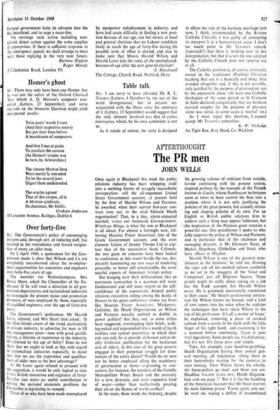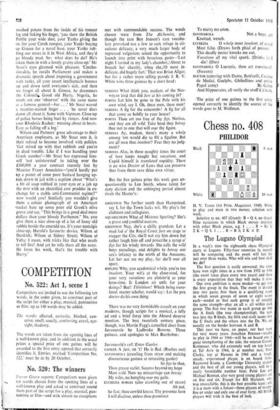The PR men
AFTERTHOUGHT JOHN WELLS
Once again at Blackpool this week the public relations industry has been whipping itself into a seething furore of savagely masochistic introspection: will the all-important United States Government account, at present held by the firm of Harold Wilson and Partners, be awarded, when their current five-year con- tract runs out, to the rival Edward Heath organisation? That, in a tiny, storm-impacted nutshell, writes our Industrial Correspondent, Winthrop Minge, is what the row at Blackpool is all about. For almost a fortnight now, fol- lowing Maurice Fraser Associates' loss of the Greek Government account, and the even clumsier failure of Jeremy Thorpe Ltd to cap- ture that of the secessionist Scots Colonels, the two giant PR concerns have been locked in conference at this resort beside the sea, des- perately hammering out new ways of rendering palatable, or better still unnoticeable, the more squalid aspects of American foreign policy.
But hanging over their deliberations like an enormous semi-colon is a question still more fundamental and still more urgent to the self- confidence of the expensively dressed public relations executives sitting among the banks of flowers in the great conference rooms: are firms like Maurice Fraser Associates, Markpress, Galitzine, the Heath Organisation, or Wilson and Partners morally entitled to dabble in power politics? Are they not, as some critics have suggested, overstepping their briefs, walk- ing naked and unprotected into a world of harsh realities and cynical necessities, in which their role can only be to provide dishonest and prob- ably irrelevant justification for the barbarous acts of others, in this case of the great powers engaged in their perpetual struggle for dom- ination of the entire planet? Would the PR men not be better employed oiling the machinery of government at home—explaining to con- sumers, for instance, the wonders of the friendly Metropolitan Water Board and the necessity for a new, dynamic, and more expensive kind of water—rather than ineffectively pouring their oil on the flames of world conflict?
In the main, those inside the Industry, despite
the growing volume of criticism from outside, favour continuing with the present system, inspired perhaps by the example of the French Institut de Gaulle, whose flamboyant techniques seem at times to have carried the firm into a position where it is not only justifying the policies of the great powers, but actually initiat- ing and shaping policies of its own. For an English or British public relations firm to achieve such a thing may appear ludicrous, but the inspiration of the Parisian giant remains a powerful one. One practitioner I spoke to who fully supports the policy of Wilson and Partners, and in particular that of the chairman and managing director, is Mr Ebenezer Stoat, of Medici, Hapsburg, Ghibelline and Stoat, who have offices in Mayfair.
'Harold Wilson is one of the greatest prac- titioners in the business,' he told me, blowing the cigar ash off his smoked salmon sandwich as we sat in the snuggery of the 'Goat and Compasses' just off Belgrave Square. 'Some people might be sniffy about taking on a job like the Yank account, but Harold Wilson never. He is genuinely emotionally committed to their cause.' Mr Stoat's professional admira- tion for Wilson knows no bounds, and a kind of awe comes into his voice when he explains the techniques that have taken Wilson to the top of his profession. 'It's all a matter of focus,' he explained, removing a piece of smoked salmon from a cavity in his teeth with the little finger of his right hand, and examining it for a moment before continuing, 'focus is your vital ingredient. Some people say it's dishonesty, but it's not. It's focus pure and simple.
`Take, for example, your headline-grabbing. Heath Organisation having their annual gen- eral meeting, all ticketyboo, sitting there in their buttonholes waiting for the cameras to start turning. Then Wilson blows his whistle, the focus-pullers go mad, and there you are. Headline WILSON FLIES OUT, Heath Organisa- tion AGM see page 7.' But it is for his handling of the American Account that Mr Stoat reserves his most fulsome praise. 'Focus again, you see,' be went on, wiping a dollop of reconstituted mashed potato from the inside of his trouser leg and licking his finger, 'you show the British Public your wide shot, your Yanks giving the OK for your Czech rumpus, your Yanks buying up Greece for a naval base, your Yanks rub- bing our noses in it in West Africa, and they'd go bloody mad. So : what does he do? He's taken them in with a lovely grainy close-up.' Mr Stoat's eyes gleamed with pleasure. 'Czecho- slovakia, he recalls Parliament and makes a dramatic speech about imposing a government with tanks, all your smart intellectuals bounce up and down until everyone's sick, and then we forget all about it. Greece, he denounces the Colonels, Good old Harry. Nigeria, he sends out one 'observer' with the same name as a famous general—but . . .' Mr Stoat waved a nicotine-stained finger . . . 'he never does damn all about it. Same with Vietnam. Close-up of police horses being hurt by rioters. And now your Rhodesia Racket : messing about in boats. Easy as falling off a log.' Wilson and Partners' great advantage to their American employers, as Mr Stoat sees it, is their refusal to become involved with politics. `Get mixed up with that rubbish and you're in dead trouble. Like if I was handling your Greek number'—Mr Stoat has expressed him- self 'not uninterested' in taking over the £100,000 a year contract recently lost by ' Maurice Fraser Associates—`you'd hardly put up a poster of some poor bastard hanging up- side down in jail with a caption about "What's a bit of soap rubbed in your eyes or a jab up the BTM with an electrified cow prodder in ex- change for a stable anti-Communist regime?" now would you? Similarly you wouldn't give them a colour photograph of an American rocket base up some poor old Greek's olive grove and say, "This brings in a good deal more dollars than your bloody Parthenon." No, you give them a nice close-up of a lot of lousy old rubble beside the emerald sea. It's your nostalgic close-up, Harold's favourite device. Wilson at Dunkirk; Wilson at Sidney Street; Wilson at Yalta: I mean, with tricks like that who needs to tell lies? And yet he tells them all the same. He loves his work, that's the trouble with Harry.'







































 Previous page
Previous page